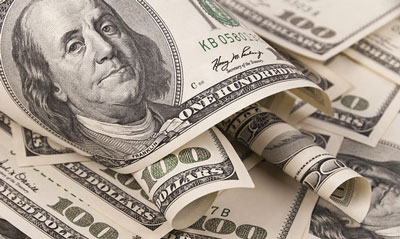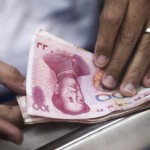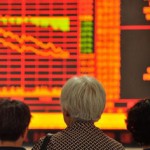Dollar Slips on Wages as Oil Drops; Chinese Stocks Drop

The dollar fell for a second day after an unexpected drop in U.S. wages clouded the outlook for interest rates, and crude oil resumed declines. Billionaire Li Ka-shing’s Cheung Kong Holdings Ltd. surged in Hong Kong after a reorganization, while Shanghai shares retreated.
The greenback weakened against most major peers by 1:38 a.m. in Hong Kong as the Australian dollar added 0.5 percent and the euro gained 0.1 percent. Cheung Kong surged 15 percent, while the Shanghai Composite Index headed for its biggest three-day drop in 18 months. Standard & Poor’s 500 Index futures fluctuated. Oil slid at least 1.7 percent in New York and London. Gold advanced 0.3 percent as copper traded near the lowest since 2009. Japan’s markets are closed today.
The biggest drop in American hourly earnings since records began in 2006 is combining with sliding oil prices to damp the outlook for U.S. inflation. That’s making an early Federal Reserve interest-rate increase less likely, reducing the allure of the dollar as it trades near a 10-year high against major peers. Cheung Kong offered $24 billion in stock to buy out unit Hutchison Whampoa Ltd. and will spin off its property assets.
‘Intense Volatility’
“This tug of war between deflation and expectations of the first rate hike in many years by the U.S. Fed is likely to result in intense volatility,” Nader Naeimi, who helps manage about $125 billion as head of dynamic asset allocation at AMP Capital Investors in Sydney, said in a Bloomberg TV interview.
While Federal Reserve officials agree they are unlikely to raise rates before late April, some officials are concerned inflation could remain below target, according to minutes of the central bank’s December meeting released last week. U.S. consumer prices rose 0.7 percent in December from a year earlier, the lowest rate since 2009, according to economists surveyed by Bloomberg before data due later this month.
The Bloomberg Dollar Spot Index fell a second day, losing 0.2 percent to 1,139.05. The gauge closed at 1,147.54 on Jan. 8, the highest since January 2005.
Emerging Currencies
Japan’s yen strengthened 0.3 percent to 118.15 per dollar, while a gauge tracking emerging Asia currencies against the greenback climbed for a fifth day.
West Texas Intermediate crude dropped 1.9 percent to $47.46 a barrel today, after sinking 8.2 percent last week. Brent oil fell 1.7 percent to $49.28 per barrel. Both contracts are heading for their lowest settlement prices since April 2009. Brent lost 11 percent last week, its worst performance since the five days to Nov. 28.
Prices need to return to $100 a barrel for economic equilibrium, Venezuelan President Nicolas Maduro said in comments broadcast on state television during a tour of OPEC producers in the Middle East. Iraq set a discount for Asian customers that was the second biggest for any month since at least August 2003.
Hang Seng
The MSCI Asia Pacific excluding Japan Index was little changed, with two stocks falling for each that rose.
China’s Shanghai Composite Index, the world’s best-performing major index in the past 12 months, dropped 2.4 percent amid speculation it’s advanced too far, too fast. The gauge is heading for a 5 percent drop through the last three days, the most for a similar period since June 2013.
“We expect the market to enter a period of fluctuation, with limited upside potential in the index in the short term,” UBS strategist Chen Li wrote in a note dated today. “The market may correct following the announcement of monetary loosening” such as a reserve-ratio cut.
Hutchison Whampoa
Hutchison Whampoa jumped 12 percent, the most since 1998, while Cheung Kong was heading for its highest close since Nov. 27. The Hang Seng Index rose 0.1 percent and would have been down without the surge by Li’s companies. A gauge of Chinese shares in Hong Kong also retreated, losing 1.6 percent.
Australia’s S&P/ASX 200 Index retreated 0.8 percent, while South Korea’s Kospi index lost 0.2 percent.
Copper for three month delivery on the London Metal Exchange swung between gains and losses after closing at $6,090 a ton on Jan. 9, the lowest level since Oct. 5, 2009. The contract hasn’t recorded a daily gain since Dec. 30 on speculation demand growth my falter amid signs of uneven economic growth in the U.S., Germany and China, the largest metals consumers.
Gold traded at $1,226.92 an ounce, the highest level since Dec. 12.
Source: bloomberg – Dollar Slips on Wages as Oil Drops; Chinese Stocks Drop




























